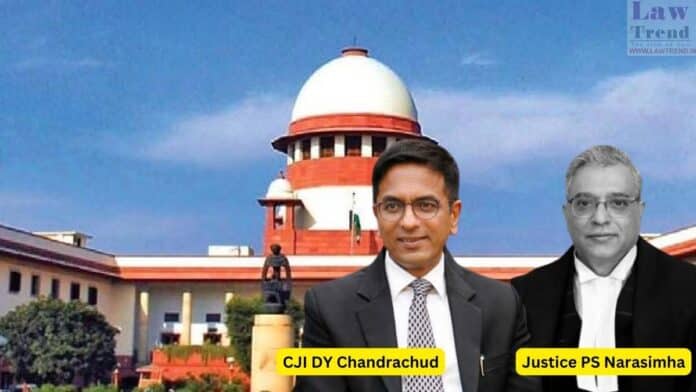The Supreme Court on Friday sought the responses of the Centre and six states on a plea moved by a Muslim body, seeking a transfer of 21 cases that have challenged state laws regulating religious conversions due to interfaith marriages to the apex court.
A bench of Chief Justice DY Chandrachud and Justice PS Narasimha issued a notice on the Jamiat Ulama-e-Hind’s plea moved through advocate MR Shamshad and asked Attorney General R Venkataramani to file a reply.
The Muslim body has sought a transfer of three petitions pending in the Gujarat High Court, five in the Allahabad High Court, three in the Himachal Pradesh High Court, three in the Jharkhand High Court, six in the Madhya Pradesh High Court and one petition in the Karnataka High Court, which have challenged the respective state laws.

“Issue notice in petitions, in which no notices have been issued till now, including the transfer petition,” the bench said.
The court was hearing a batch of petitions, including pleas that have questioned alleged religious conversion through allurement or by force and those that have challenged the validity of the state anti-conversion laws.
Besides, two separate petitions have been filed by Gujarat and Madhya Pradesh, challenging the interim orders of the respective high courts that stayed certain provisions of the state laws on conversion.
Appearing in the court on behalf of advocate Ashwini Upadhyay, senior advocate Arvind Datar said in the last hearing, several parties had raised objections to the contentions made in the additional affidavit and therefore, he was withdrawing the same.
Representing one of the parties, senior advocate Dushyant Dave said objectionable contentions were made by Upadhyay not only in the additional affidavit, but also in the writ petitions.
The bench told Datar, “You are appearing here as an officer of the court. Therefore, just ensure that there is no such statements made even in the petition.”
It said if the petitions raise common questions, the court would hear the pleas together.
The bench said it did not start the final arguments on Friday as notices were not issued in many of the petitions and once the replies of all the parties are on record, it would start hearing the matter, and posted it after three weeks.
On January 30, the top court had said it would hear the batch of pleas challenging the controversial state laws regulating religious conversions due to interfaith marriages on February 3.
One of the petitioners, NGO “Citizens for Justice and Peace” of activist Teesta Setalwad, had submitted that people cannot get married due to these state laws and the situation is very grave.
The attorney general had submitted that these are state legislations that have been challenged before the apex court and the high courts concerned should hear these cases.
The top court had earlier asked the parties challenging the anti-conversion laws of several states to file a common petition, seeking a transfer of the cases from various high courts to the apex court.
Solicitor General Tushar Mehta had challenged the locus standi of “Citizens for Justice and Peace”. However, he had not elaborated on the reasons for questioning the NGO’s locus.
The top court had noted that there were at least five such pleas “before the Allahabad High Court, seven before the Madhya Pradesh High Court, two each before the Gujarat and Jharkhand high courts, three before the Himachal Pradesh High Court, and one each before the Karnataka and Uttarakhand high courts”, and said a common petition for their transfer could be filed.
Earlier, a bench headed by Justice MR Shah had said religious conversion is a serious issue that should not be given a political colour.
It had sought the attorney general’s assistance on the plea filed by Upadhyay.
Another bench headed by the CJI had, on January 2, sought to know the status of the cases pending before the high courts and said if the cases are similar in nature, it might transfer those to itself.
It had asked “Citizens for Justice and Peace” and the states of Uttar Pradesh, Madhya Pradesh, Uttarakhand and Himachal Pradesh to apprise it of the status of the cases challenging the state laws on conversion through marriage.
The apex court had, on January 6, 2021, agreed to examine certain new and controversial laws of Uttar Pradesh and Uttarakhand, regulating religious conversions due to interfaith marriages.
The Uttar Pradesh law relates to not only interfaith marriages but all religious conversions and lays down elaborate procedures for anyone who wishes to convert to another religion.
The Uttarakhand law entails a two-year jail term for those found guilty of religious conversion through “force or allurement”. The allurement can be in the form of cash, employment or material benefits.
The plea filed by the NGO has alleged that the legislations violate articles 21 and 25 of the Constitution as those empower the State to suppress an individual’s personal liberty and freedom to practise the religion of his choice.
The Jamiat Ulama-e-Hind had also moved the Supreme Court, challenging the anti-conversion laws of Uttar Pradesh, Madhya Pradesh, Gujarat, Uttarakhand and Himachal Pradesh. It had contended that these laws were enacted to “harass” interfaith couples and implicate them in criminal cases.
The Muslim body, in its PIL filed through advocate Ejaz Maqbool, had said the provisions of all such laws of the five states forced people to disclose their faith and consequently, invaded their privacy.







